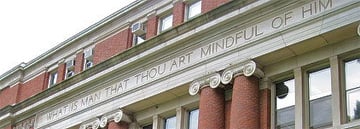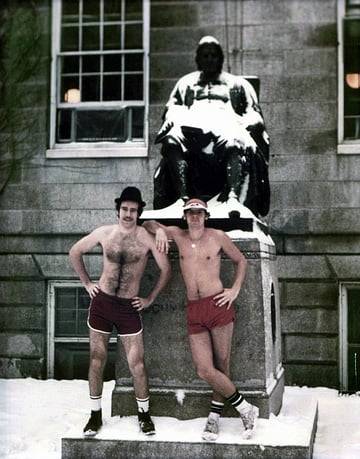Today, thousands of people will descend upon Harvard Yard as the university celebrates its 359th Commencement (graduation). Half of Harvard Yard will be transformed into the Tercentenary Theatre as thousands of students “commence” their new lives as Harvard graduations.
 One of the borders of the Tercentenary Theatre is Emerson Hall. In ordinary life, it houses the university’s philosophy department. In fact, I spent countless hours there as an undergraduate with a concentration (major) in philosophy. But, as it turns out, Emerson Hall is much more than a building for academic pursuits. It’s a landmark on the Harvard campus, and one that embodies one of the most striking ironies Harvard has to offer.
One of the borders of the Tercentenary Theatre is Emerson Hall. In ordinary life, it houses the university’s philosophy department. In fact, I spent countless hours there as an undergraduate with a concentration (major) in philosophy. But, as it turns out, Emerson Hall is much more than a building for academic pursuits. It’s a landmark on the Harvard campus, and one that embodies one of the most striking ironies Harvard has to offer.
Emerson Hall rose to fame because of it’s role in one of the most popular movies in 1970. The tear-jerking classic, Love Story, starred Ryan O’Neal as Oliver Barrett IV and Ali McGraw as Jennifer Cavilleri, both of whom were students at Harvard. (Technically, Jennifer was a student at Radcliffe College.) This was the movie that popularized the (un)forgettably profound line, “Love means never having to say you’re sorry.” Parts of Love Story were filmed on the Harvard campus. One key building, called Barrett Hall in the movie, was in fact Emerson Hall, the haunts of the Harvard philosophy department.
As an undergraduate concentrating in philosophy, I was required to take a few courses in the history of philosophy. But, for the most part, my fellow students and I studied contemporary philosophy, including logic and philosophy of language. In these classes, I was taught that truth was merely a human construct, and that God was basically irrelevant to human thought. One of my professors actually acknowledge that the existence of God was 50% probable. I expect the Lord was glad to hear that! The philosophy faculty at Harvard apparently did not uphold the vision of the Harvard seal: veritas christo et ecclesiae, “Truth for Christ and the church.”
 The fact that the great Harvard philosophers inhabited Emerson Hall struck me as extraordinarily ironic, but not only because this building had co-starred in Love Story. Rather, the irony of ironies had to do with what was engraved in stone on the outside of Emerson Hall. There, in giant letters, was a portion of Psalm 8: “WHAT IS MAN THAT THOU ART MINDFUL OF HIM.”
The fact that the great Harvard philosophers inhabited Emerson Hall struck me as extraordinarily ironic, but not only because this building had co-starred in Love Story. Rather, the irony of ironies had to do with what was engraved in stone on the outside of Emerson Hall. There, in giant letters, was a portion of Psalm 8: “WHAT IS MAN THAT THOU ART MINDFUL OF HIM.”
This line, a portion of Psalm 8:4, calls us to humility before the wonders of the Creator God. It reminds us of our smallness and weakness when compared with the majesty and might of the Lord. Yet, inside the hallowed walls of Emerson Hall, some of the finest minds of the 20th century reversed the order. God was neglected or denied to exist by the greatness and power of contemporary philosophy.
Had Emerson Hall been built in the 1970’s (and in the years since), it might well have been inscribed with “WHAT IS GOD THAT THOU ART MINDFUL OF HIM.” Or perhaps “MAN IS ALL WE HAVE TO BE MINDFUL OF.” My guess is that the statement of the ancient Greek philosopher Protragoras would have prevailed: “MAN IS THE MEASURE OF ALL THINGS.” (Of course the use of “man” as a generic would never be tolerated today! So it would have to be the considerably less elegant ‘HUMANKIND IS THE MEASURE OF ALL THINGS.” In fact, Protagoras’ quotation had been suggested for the inscription, but Harvard President C.W. Eliot chose the Psalm text instead.)
It’s almost too easy to laugh at the irony of Emerson Hall with its erudite atheist inhabitants. But before I chuckle too hard, I ought to examine my own life. Do I live as if it’s a wonder that God is mindful of me? Or do I live as if I were the measure of all things? Though I believe in God, am I living humbly before God today – really? Moreover, am I living as if I had relationship with the all-powerful Creator of the universe? Do my prayers reflect this sort of faith?
Psalm 8 concludes with a double punch line. On the one hand, it reveals that we have been made “a little lower than God” and been given dominion over God’s creation (8:5-8). So, though humbled by God’s greatness, we nevertheless have been honored by him as his royal stewards. On the other hand, the Psalm concludes as it began, with praise of God’s greatness: “O LORD, our Sovereign, how majestic is your name in all the earth!” (8:9). Here is a verse that ought to be engraved upon our minds and hearts!

